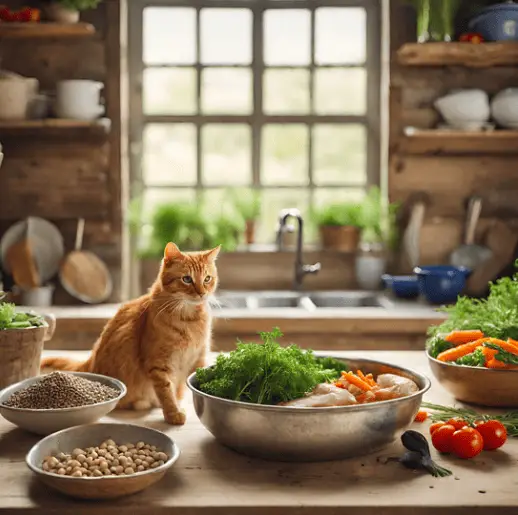
Discover the delightful difference in your feline friend’s life by feeding them homemade food!
Have you ever wondered if cats live longer on a diet created with love from your own kitchen? This article will provide you with all the essential information you need to know.
Uncover the potential benefits, learn about their nutritional needs, and explore homemade cat food recipes.
Transition your beloved pet with expert tips, while also understanding the common risks and pitfalls.
Consult a veterinarian to ensure a balanced homemade diet.
Make informed decisions for a healthier, happier cat!
KEY TAKEAWAY
Do cats live longer on homemade food?
Cats can thrive on well-balanced homemade diets, potentially contributing to their longevity, but consultation with a veterinarian is crucial. Feel free to use these titles and key takeaways as needed. If you have more questions or require further assistance, please let me know.
The Potential Benefits of Homemade Food for Cats
You should consider the many potential benefits of feeding your cat homemade food. When you prepare your cat’s meals at home, you have complete control over the ingredients. This allows you to choose high-quality protein sources, such as lean meats, which can promote healthy muscle development. Additionally, homemade food gives you the opportunity to include a variety of fruits and vegetables, which provide essential vitamins and minerals.
Another benefit of homemade cat food is that you can avoid potentially harmful additives and preservatives. Many commercial cat foods contain artificial colors, flavors, and preservatives that may have negative effects on your cat’s health. By preparing your cat’s food at home, you can ensure that it’s free from these additives.
Feeding your cat homemade food may also help to improve their digestion. Some cats have sensitivities or allergies to certain ingredients commonly found in commercial cat food. When you prepare their meals at home, you can tailor the ingredients to their specific needs, potentially alleviating digestive issues.
Furthermore, homemade cat food can be a great option for cats with medical conditions. For example, if your cat has kidney disease, you can create a specialized diet that supports their kidney function. Similarly, if your cat is overweight, you can control their calorie intake by preparing portion-controlled meals.
Understanding the Nutritional Needs of Cats
To ensure optimal health and well-being, it’s important to understand and meet the nutritional needs of your cat. Cats are obligate carnivores, which means they require a diet that’s primarily made up of animal protein. Unlike humans and some other animals, cats can’t produce certain essential nutrients on their own and must obtain them from their diet. These nutrients include taurine, arachidonic acid, and vitamin A. Taurine, in particular, is crucial for cats as it supports normal vision, heart function, and reproductive health. A deficiency in taurine can lead to serious health issues such as heart disease and impaired vision.
In addition to protein, cats also require specific amounts of fats, carbohydrates, vitamins, and minerals in their diet. Fats provide a concentrated source of energy and help with the absorption of fat-soluble vitamins. Carbohydrates, although not essential, can provide a source of energy and fiber. It’s important to note that cats have a limited ability to digest and utilize carbohydrates compared to other animals. Therefore, their diet should be primarily focused on animal-based protein sources.
Meeting the nutritional needs of your cat can be achieved through a balanced commercial cat food that’s formulated to provide all the necessary nutrients. These cat foods are specifically designed to meet the unique requirements of cats at different life stages, such as kitten, adult, and senior. It’s essential to choose a high-quality cat food that’s labeled as ‘complete and balanced’ to ensure that your cat is receiving all the necessary nutrients in the right proportions.
Homemade Cat Food Recipes: What to Include and Avoid
Include a variety of fresh, high-quality ingredients in your homemade cat food recipes to ensure your cat’s nutritional needs are met. When preparing homemade cat food, it’s important to include a balanced combination of proteins, fats, and carbohydrates.
Protein is crucial for cats as it provides essential amino acids that support muscle growth and overall health. Good sources of protein for homemade cat food include cooked chicken, turkey, or fish. You can also include organ meats like liver, which are rich in nutrients.
Fats are another important component of a cat’s diet, providing them with energy and aiding in the absorption of vitamins. Include healthy fats such as fish oil or flaxseed oil in your homemade cat food recipes.
Carbohydrates are less essential for cats, but they can provide a source of energy. Include small amounts of cooked rice, sweet potatoes, or quinoa in your cat’s homemade food.
It’s important to avoid certain ingredients that can be harmful to cats. These include onions, garlic, grapes, raisins, chocolate, and caffeine. Additionally, avoid using ingredients that are toxic to cats, such as xylitol, which is found in many sugar-free products.
Transitioning Your Cat to a Homemade Diet: Tips and Considerations
When starting to transition your cat to a homemade diet, gradually introduce the new food over a period of one to two weeks. Sudden dietary changes can upset your cat’s digestive system, leading to stomach upset and diarrhea. Begin by mixing a small amount of the homemade food with your cat’s current commercial diet. Over the course of several days, gradually increase the proportion of homemade food while decreasing the commercial food. This slow transition allows your cat’s digestive system to adjust to the new diet.
It is essential to monitor your cat’s health and behavior during the transition process. Keep an eye out for any signs of gastrointestinal distress, such as vomiting or excessive diarrhea. If you notice any concerning symptoms, consult your veterinarian for guidance.
During the transition, make sure to provide your cat with plenty of fresh water. Homemade diets often have higher moisture content than commercial diets, which can help prevent dehydration. Ensure that your cat has access to clean water at all times.
Additionally, it’s crucial to provide a balanced and nutritionally complete homemade diet for your cat. Consult with a veterinarian or a veterinary nutritionist to ensure that your cat’s homemade food meets all of their nutritional needs. They’ll be able to provide guidance on portion sizes and ingredient selection to ensure your cat receives the right balance of proteins, fats, carbohydrates, vitamins, and minerals.
Common Risks and Pitfalls of Feeding Cats Homemade Food
Watch out for potential health risks and pitfalls when feeding your cat homemade food. While homemade diets can provide cats with a variety of nutrients and potentially improve their overall health, there are certain risks that need to be considered. Here are four common risks and pitfalls of feeding cats homemade food:
- Nutritional imbalances: Cats have specific dietary requirements, including the need for certain amino acids, vitamins, and minerals. Homemade diets may not always meet these requirements, leading to nutritional imbalances and deficiencies.
- Lack of expertise: Creating a balanced homemade diet for your cat requires knowledge of feline nutrition and careful formulation. Without proper expertise, it’s easy to unintentionally leave out essential nutrients or include harmful ingredients.
- Contamination and foodborne illnesses: Homemade diets can be prone to bacterial contamination, especially if raw meat is used. Improper handling and storage of ingredients can lead to foodborne illnesses, which can be dangerous for both cats and humans.
- Time and effort: Preparing homemade cat food can be time-consuming and labor-intensive. It requires careful planning, sourcing quality ingredients, and ensuring proper food preparation techniques. It’s important to consider whether you have the time and resources to consistently provide a balanced homemade diet for your cat.
To mitigate these risks, consult with a veterinarian or a board-certified veterinary nutritionist to develop a balanced homemade diet that meets your cat’s specific nutritional needs. Regular veterinary check-ups and monitoring are essential to ensure your cat’s health and well-being on a homemade diet.
Consulting With a Veterinarian: Ensuring a Balanced Homemade Diet
To ensure a balanced homemade diet for your cat, you should consult with a veterinarian or veterinary nutritionist.
While homemade cat food can be a great way to provide your feline friend with a nutritious and personalized diet, it’s important to seek professional advice to ensure that all their nutritional needs are being met.
A veterinarian or veterinary nutritionist can help you create a diet plan that takes into account your cat’s age, breed, size, and any specific health conditions they may have.
When consulting with a professional, be prepared to provide information about the ingredients you plan to use in your cat’s homemade meals. They’ll be able to advise you on the appropriate balance of protein, fats, carbohydrates, vitamins, and minerals that your cat requires. They may also suggest specific supplements, such as taurine or omega-3 fatty acids, that are important for your cat’s overall health.
Additionally, a veterinarian or veterinary nutritionist can help you navigate any potential risks or pitfalls associated with homemade cat food. They can guide you on safe food handling practices, recommended cooking methods to eliminate bacteria or parasites, and the appropriate portion sizes for your cat’s age and activity level.
Making Informed Decisions: Weighing the Pros and Cons of Homemade Cat Food
Before making a decision, you should carefully consider the pros and cons of feeding your cat homemade food. While homemade cat food can offer certain benefits, it also comes with potential drawbacks. Here are some factors to consider:
- Nutritional Balance: Homemade cat food allows you to have control over the ingredients and ensure your cat receives a balanced diet. However, formulating a nutritionally complete meal requires knowledge and expertise in feline nutrition.
- Quality Control: By preparing the food yourself, you can ensure the quality of the ingredients used. This can be especially beneficial if your cat has specific dietary needs or allergies. However, it requires time and effort to source high-quality ingredients consistently.
- Cost: Homemade cat food can be more cost-effective in the long run, especially if your cat has specific dietary requirements. However, it may initially require an investment in kitchen equipment and specialized ingredients.
- Time and Convenience: Preparing homemade cat food requires time and effort, including meal planning, ingredient preparation, and cooking. It may not be suitable for everyone, particularly those with busy schedules.
Ultimately, the decision to feed your cat homemade food should be based on careful consideration of these factors, as well as consultation with your veterinarian. They can provide guidance on formulating a nutritionally balanced diet that meets your cat’s specific needs.
Conclusion
In conclusion, while homemade cat food may have potential benefits such as increased control over ingredients and customization, it’s important to understand and meet the nutritional needs of cats.
Transitioning to a homemade diet requires careful planning and consideration to avoid common risks and pitfalls. Consulting with a veterinarian is crucial to ensure a balanced diet.
Ultimately, making informed decisions about homemade cat food involves weighing the pros and cons to provide the best possible care for your feline companion.

Stephanie Ansel is a well-known writer and journalist known for her unique and captivating writing style. She has written many articles and books on important topics such as the lifestyle, environment, hobbies, and technology and has been published in some of the biggest newspapers and magazines. Stephanie is also a friendly and approachable person who loves to talk to people and learn about their stories. Her writing is easy to read and understand, filled with lots of details and information, and is perfect for both kids and adults who want to learn about important topics in an interesting way.





